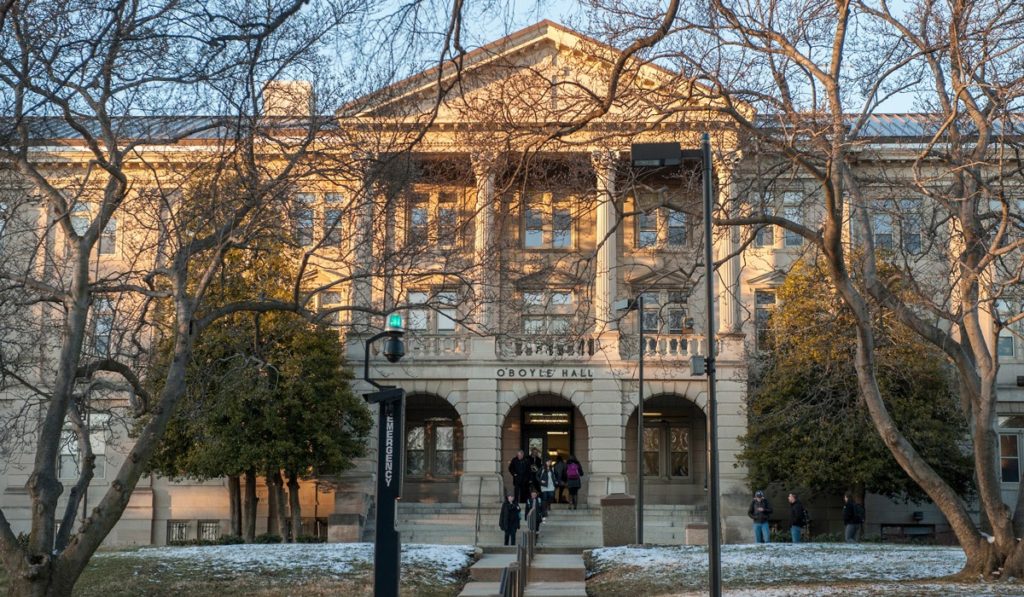University Counseling Center Works to Expand its Online Services

Image Courtesy of Catholic University
By Theresa Whitfield
Catholic University’s Counseling Center continues to operate remotely to students across the country, with no anticipation of returning to in-person operations this semester.
The center follows guidelines set by the university and the Center for Disease Control and Prevention, according to Dr. Monroe Rayburn, director of the Counseling Center, in order to protect its staff and students. Exposure to COVID-19, especially for those with health risks, could potentially lead to students being without their therapists for weeks. Additionally, while K-12 schools continue to operate remotely, juggling childcare and working in person presents an increasingly difficult challenge to staff members with children.
Despite these obstacles, all of the staff works in person at least part-time. The center is also continuing to take steps to reach as many students across the country as possible. Because therapists can only operate in states where they are licensed to practice, only students living in D.C. have access to the full range of the center’s services. When the pandemic caused college students to return to their homes last March, many states granted therapists temporary licenses to be able to continue working with clients across the country. However, by the fall, most of these licenses expired.
“At the peak of things in the summer, we were probably seeing clients who were located in twenty or more states,” Rayburn said. “By the end of the summer, a lot of these states were letting their state of emergency expire, and it was tough because we weren’t able to see as many people in the fall as we were able to in the summer having to do with the licensing issue even though a lot of people did stay home.”
To address this need, many of the center’s therapists have worked to expand their licenses to Maryland and Virginia, as many students reside in those states. Other states where many students live, such as Pennsylvania and New Jersey, have continued to be flexible with temporary licensing, allowing students located in those states to have greater access to the center’s services.
The center has also expanded its group sessions as another form of outreach. In a normal semester, the center offers five to seven therapy groups. In a big adjustment, eight groups are offered this semester, three for therapy and five for psychoeducation.
Rayburn commented that traditionally, most of the groups the center offers are therapy groups with typical licensing and confidentiality requirements. The psychoeducation groups are less private and more educational, giving members various resources, such as coping skills and support networks. According to the Counseling Center’s website, “while Counseling Center clinicians facilitate Psychoeducation Groups, and participation may have therapeutic benefit for the members, it does not imply that participants are in therapy or are clients at the Counseling Center.” The nature of these groups allows the center to reach students in states where its therapists are not licensed.
For Rayburn, the Psychoeducation Groups function as a way for the Counseling Center “to work around the licensing restrictions while still being able to offer a group therapy-like experience. It’s kind of like group therapy, kind of like a workshop.”
With an increase of students on campus from last semester, the number of appointments being made is on par with any other typical semester. While there is not currently a waitlist, it is always a concern for the center during any spring semester because of “the cumulative impact of everyone that started in the fall and all the new people coming in,” according to Rayburn.
“The real test is to see how we are doing around mid-semester,” Rayburn said. An influx of appointments usually occurs around this time, however, by the end of the year, appointment numbers tend to drop and level out. The option for students to book bi-weekly, instead of weekly appointments, has helped to mitigate the need for a waitlist.
Any student interested in utilizing the Counseling Center or its resources is encouraged to visit the Counseling Center website or call 202-319-5765 during its business hours to schedule an appointment. In the case of an emergency, please contact DPS at 202-319-5111 or a 24-hour crisis hotline at 202-561-7000.





